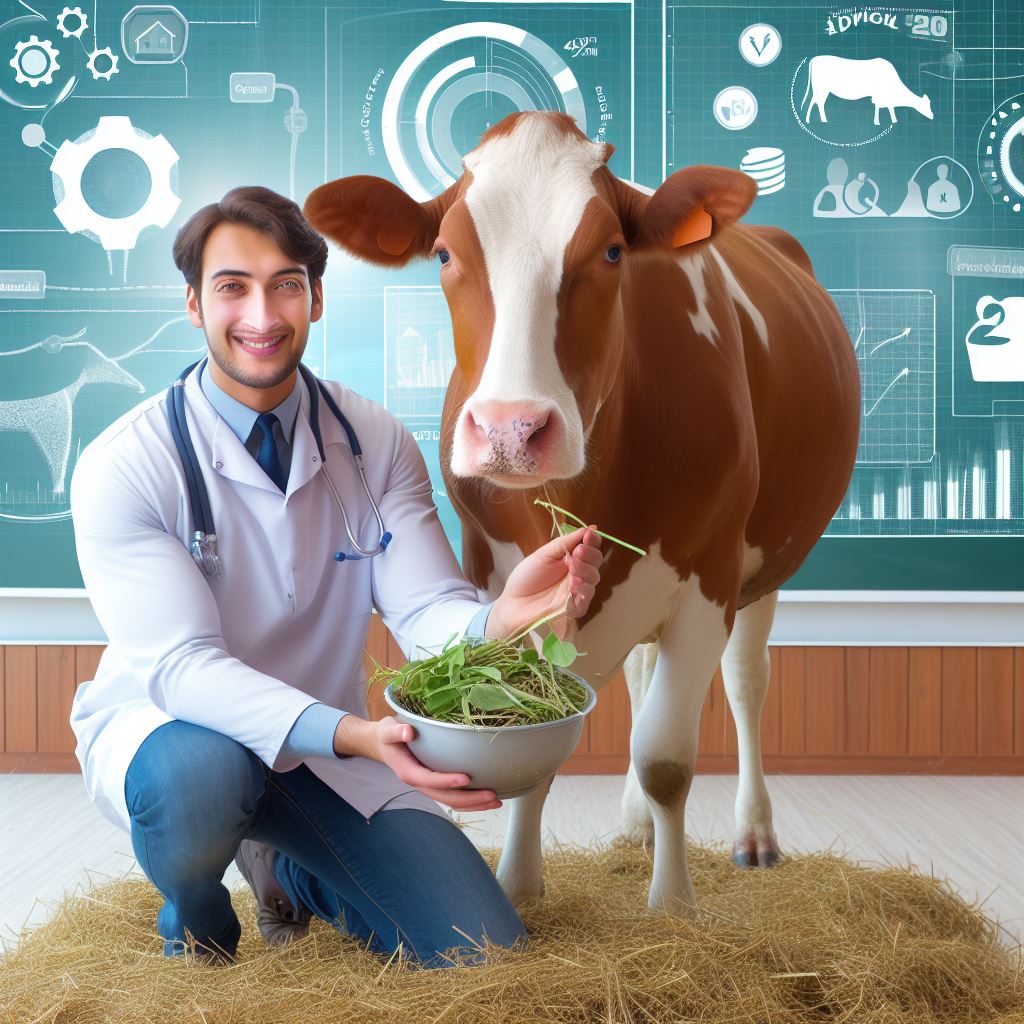Introduction
Organic poultry farming is a method of raising chickens and other birds without the use of synthetic chemicals, hormones, or antibiotics.
It focuses on utilizing natural methods to ensure the utmost health and welfare of the animals.
Brief explanation of organic poultry farming
Organic poultry farming revolves around providing birds with a natural and healthy environment, where they can live and grow under optimum conditions.
It emphasizes the use of organic feed, access to outdoor spaces, and humane treatment.
Importance of following best practices for organic poultry farming
Following best practices is essential in organic poultry farming to maintain the integrity of the organic label.
By adhering to these guidelines, farmers can ensure that the products they provide are truly organic, meeting consumer expectations and increasing market demand.
Best practices include proper hygiene and cleanliness, regular health monitoring, and the use of organic feed.
These practices help prevent the spread of diseases and maintain the overall well-being of the birds.
Additionally, maintaining adequate living conditions, such as providing ample space, ventilation, and natural light, is crucial for the birds’ physical and mental health.
By adhering to best practices, organic farmers can also contribute to the preservation of the environment.
Organic poultry farming reduces the use of chemical fertilizers, pesticides, and antibiotics, minimizing water and soil contamination.
It promotes biodiversity, as organic farms often provide habitats for various species, contributing to a more sustainable ecosystem.
Therefore, organic poultry farming focuses on natural methods to raise birds, promoting their welfare and providing consumers with genuine organic products.
Following best practices is key to ensuring the health of the birds, meeting consumer expectations, and contributing to environmental sustainability.
Choosing the Right Breeds
Choosing the right breeds is crucial when it comes to organic poultry farming.
Transform Your Agribusiness
Unlock your farm's potential with expert advice tailored to your needs. Get actionable steps that drive real results.
Get StartedOrganic poultry farms prioritize animal welfare, natural methods, and organic feed.
In order to achieve success in this type of farming, it is important to carefully select the appropriate breeds that are suitable for organic practices.
This blog section will explore the importance of breed selection, the criteria to consider, and provide examples of popular organic poultry breeds.
Importance of selecting breeds suitable for organic farming
Firstly, the selection of breeds suitable for organic farming is of utmost importance.
Organic poultry farming focuses on providing a natural environment for the birds, allowing them to express their natural behaviors.
This includes free-range access to the outdoors, fresh air, and sunlight.
Therefore, breeds that can adapt well to outdoor conditions are vital for organic poultry farms.
Criteria to consider when choosing organic poultry breeds
When considering the criteria for choosing organic poultry breeds, several factors should be taken into account.
Disease resistance is a significant factor to consider, as organic farming avoids the use of synthetic antibiotics.
Breeds with strong immune systems and natural resistance to diseases can greatly reduce the need for medical interventions.
Another criterion to consider is the ability of the breed to forage.
Organic poultry is encouraged to graze and search for food naturally, which helps in maintaining their health and nutrition.
Selecting breeds that have good foraging abilities will ensure that they can find a significant portion of their diet from the organic pasture and reduce the reliance on artificial feeds.
Additionally, organic poultry breeds should be able to withstand outdoor conditions.
They should be resistant to extreme temperatures, as they will be exposed to the elements.
Breeds that are compatible with the climate and environmental conditions of the organic farm will have higher chances of success.
Examples of popular organic poultry breeds
There are several popular organic poultry breeds that farmers often choose.
Rhode Island Reds are known for their resilience, adaptability, and ability to lay large brown eggs.
Sussex breeds are also popular due to their hardiness, versatility, and good foraging skills.
Plymouth Rocks are yet another preferred choice as they are low maintenance, adaptable, and excellent foragers.
Most importantly, choosing the right breeds is a crucial step in organic poultry farming.
The breeds should be suitable for outdoor conditions, have disease resistance, and possess good foraging abilities.
Examples of popular organic poultry breeds include Rhode Island Reds, Sussex, and Plymouth Rocks.
By selecting the appropriate breeds, organic poultry farmers can ensure the success of their operations while maintaining the principles of organic farming.
Showcase Your Farming Business
Publish your professional farming services profile on our blog for a one-time fee of $200 and reach a dedicated audience of farmers and agribusiness owners.
Publish Your ProfileRead: Ethical Pig Farming Essentials
Organic Feed and Nutrition
In the world of organic poultry production, one of the key factors for success is feeding the birds with the right kind of feed.
Organic feed plays a crucial role in ensuring the health and wellbeing of organic poultry.
Here, we will explore the importance of organic feed for organic poultry, their nutritional requirements, and the various sources and options for formulating feed rations.
Importance of Organic Feed for Organic Poultry
Organic poultry are raised without the use of antibiotics, hormones, or genetically modified organisms (GMOs).
To maintain their organic status, these birds must consume feed that is free from synthetic chemicals and pesticides.
The use of organic feed promotes the overall health and productivity of organic poultry.
It helps in preventing diseases and maintaining a strong immune system.
Organic feed also ensures that the meat and eggs produced by these birds are free from harmful residues.
Nutritional Requirements of Organic Poultry
Organic poultry have similar nutritional requirements to conventional poultry.
They need a balanced diet that provides them with essential vitamins, minerals, amino acids, and proteins.
Organic poultry require feed that is high in energy to support their growth and daily activities.
A combination of grains, seeds, and legumes provide the necessary carbohydrates and proteins for these birds.
In addition to carbohydrates and proteins, organic poultry also need a variety of vitamins and minerals.
Calcium, phosphorus, vitamin A, and vitamin D are particularly important for their bone health, egg production, and overall wellbeing.
Sources of Organic Feed and Options for Formulating Feed Rations
Several sources offer organic feed specifically formulated for organic poultry.
These feeds are often made from a variety of grains, such as corn, wheat, and barley, along with organic plant-based protein sources like soybean meal.
Farmers can also create their own feed rations by sourcing organic ingredients.
This allows them to have more control over the quality of the feed and customize it according to their specific needs.
Common components of homemade organic feed include whole grains, legumes, and various supplements.
It is essential to ensure that the organic feed meets the necessary nutritional requirements of the birds.
Feed formulas can be developed with the help of nutritionists or by referring to guidelines provided by organic certification agencies.
Another important consideration in formulating feed rations is providing access to pasture and foraging opportunities for the birds.
This allows them to supplement their diet with insects, plants, and grass, which contributes to their overall health and wellbeing.
In essence, organic feed is of utmost importance for organic poultry.
It ensures the birds receive a balanced diet while maintaining their organic status. Farmers have various options, including commercially available organic feed and formulating their own feed rations.
By meeting the nutritional requirements of the birds, organic poultry farmers can successfully raise healthy and productive flocks.
Read: Sustainable Sheep Rearing Tips
Housing and Shelter
Providing adequate housing for organic poultry is crucial for their welfare and overall production.
One of the main factors to consider when providing housing for organic poultry is the space requirements.
Organic poultry should have enough space to move around freely and engage in natural behaviors.
The housing should be designed in a way that allows for easy access to food and water.
It is important to consider the number of birds being housed to ensure sufficient space for each individual.
Organic poultry housing should also prioritize proper ventilation to maintain optimal air quality.
Ensuring proper ventilation, lighting, and space requirements
Adequate ventilation helps to reduce heat stress, prevent respiratory diseases, and control odors.
Natural ventilation through windows, vents, or open sides is preferred over mechanical ventilation systems.
Lighting is another important factor to consider in organic poultry housing.
Natural light should be provided to promote the birds’ natural circadian rhythms.
If artificial lighting is used, it should mimic natural daylight and provide a minimum of 8 hours of darkness for rest.
The housing should also be designed to protect the organic poultry from predators.
Showcase Your Farming Business
Publish your professional farming services profile on our blog for a one-time fee of $200 and reach a dedicated audience of farmers and agribusiness owners.
Publish Your ProfileFencing or wire mesh can be used to create a secure outdoor area while still allowing access to fresh air and sunlight.
The flooring material in the housing should be easily cleanable to maintain good hygiene.
Bedding material such as straw, wood shavings, or sand can be used to provide comfort for the birds.
Regular cleaning and disinfection of the housing is essential to prevent the spread of diseases.
The housing should also have proper waste management systems in place.
Manure should be removed regularly to prevent accumulation and potential health risks for the birds.
Organic poultry housing should be located away from sources of pollution, such as industrial areas or highways.
Avoiding exposure to chemical contaminants is important to maintain organic integrity.
Regular inspections of the housing should be conducted to identify and address any maintenance issues.
The overall goal of organic poultry housing is to provide a safe, clean, and comfortable environment for the birds to thrive.
In fact, organic poultry housing should prioritize space requirements, proper ventilation, lighting, and protection from predators.
Good hygiene, waste management, and regular maintenance are also essential for the welfare and optimal production of organic poultry.
Providing a suitable housing environment is a key aspect of organic poultry best practices.
Read: Eco-Friendly Beef Farming: A Guide
Outdoor Access and Pasture Management
Outdoor access is crucial for organic poultry as it provides several benefits.
- Enhanced Animal Welfare: Allowing poultry to roam freely outdoors enables them to engage in natural behaviors like foraging, dust bathing, and pecking. This promotes their overall well-being and reduces stress.
- Healthier Birds: Exposure to fresh air, sunlight, and natural surroundings improves the immune system of poultry. It also minimizes the risk of diseases, as they are less likely to be exposed to pathogens compared to confined birds.
- Nutrient-Rich Eggs and Meat: Organic poultry that have access to outdoor areas produce eggs and meat that are richer in essential nutrients like Omega-3 fatty acids. These nutrients are transferred from the diverse range of plants and insects they consume while foraging.
- Sustainable Farming: Outdoor access helps in sustainable farming practices as it allows poultry to contribute to the ecosystem by participating in nutrient cycling. Their droppings enrich the soil, promoting the growth of vegetation and reducing the need for fertilizers.
Guidelines for providing access to organic pastures
To provide access to organic pastures, certain guidelines should be followed.
- Space Requirement: Allocate at least 2.5 square meters per bird in outdoor areas to ensure they have enough space to roam and exhibit their natural behaviors.
- Fencing: Install secure fencing to prevent predators from entering and harming the poultry. The fence should be tall enough to deter predators like foxes or raccoons.
- Vegetation: Ensure that the outdoor area has a variety of vegetation, including grass, shrubs, and trees. This provides shade, hiding spots, and diverse food sources for the poultry.
- Accessible Water and Shelter: Place waterers and shelters in the outdoor area so that poultry can easily access them. This ensures their hydration and protection from extreme weather conditions.
Strategies for managing pastures and rotational grazing
Managing pastures and implementing rotational grazing strategies are vital for maintaining the health of organic poultry and the environment.
- Rotational Grazing: Divide the pasture into smaller sections and rotate the poultry between these sections periodically. This prevents overgrazing and allows the pasture to recover.
- Rest Periods: Allow the pasture to rest for a specific duration between grazing cycles. This rest period allows the vegetation to regrow, maintaining its nutritional content and preventing soil erosion.
- Pasture Management: Regularly monitor the pasture for pests, weeds, and disease. Implement integrated pest management techniques and remove any invasive plants to maintain a healthy pasture.
- Supplemental Feeding: While pasture foraging is crucial, supplemental feeding may be necessary to meet the nutritional requirements of poultry, especially during adverse weather conditions or low forage availability.
Basically, outdoor access is essential for organic poultry as it improves their welfare, health, and the quality of eggs and meat.
Following guidelines for providing access to organic pastures and implementing proper pasture management strategies ensures the well-being of the poultry and promotes sustainable farming practices.
Read: Pasture Renovation: When & How

Health Management
Maintaining the health of organic poultry is crucial for both the welfare of the birds and the success of the farm.
By implementing preventive measures, using natural remedies instead of antibiotics, and following regular health checks and vaccination schedules, poultry farmers can effectively manage diseases in their flocks.
Preventive measures for organic poultry diseases
Preventive measures are the cornerstone of organic poultry health management.
Farmers should focus on optimizing their farm’s biosecurity to minimize the risk of disease outbreaks.
This includes implementing strict hygiene measures, such as regular cleaning and disinfection of the poultry houses and equipment.
Additionally, farmers should control the movement of people, vehicles, and other animals onto the farm to prevent the introduction of pathogens.
Organic poultry farmers should also prioritize good nutrition to support the immune system of their birds.
Providing a well-balanced, organic diet that meets all the nutritional requirements of the poultry is essential.
Farming practices that promote access to clean water, fresh air, and ample space for the birds to roam freely also contribute to their overall health.
Natural remedies and alternatives to antibiotics
In organic poultry farming, the use of antibiotics is limited or prohibited.
Therefore, farmers must seek out natural remedies and alternatives to maintain the health of their birds.
Essential oils, probiotics, and herbal supplements are commonly used to boost immunity and prevent diseases.
These natural options help reduce the reliance on antibiotics while still effectively managing health concerns.
Regular health checks and vaccination schedules
Regular health checks are vital to identify any health issues early on.
Farmers should conduct thorough inspections of their birds, looking for signs of illness, such as abnormal behavior, decreased appetite, or changes in physical appearance.
By detecting problems early, farmers can intervene promptly and prevent the spread of diseases within the flock.
Vaccination is another important aspect of health management in organic poultry farming.
Following vaccination schedules recommended by veterinarians ensures that the birds are protected against common diseases.
Vaccines stimulate the immune system, enabling birds to fight off potential infections more effectively.
Working closely with a veterinarian who understands the principles of organic poultry farming is crucial for implementing an effective health management plan.
Showcase Your Farming Business
Publish your professional farming services profile on our blog for a one-time fee of $200 and reach a dedicated audience of farmers and agribusiness owners.
Publish Your ProfileVeterinarians can provide guidance on disease prevention strategies, recommend suitable natural remedies, and help develop a customized vaccination schedule based on the specific needs of the flock.
Essentially, maintaining the health of organic poultry requires proactive measures such as strict biosecurity practices, a well-balanced organic diet, and the use of natural remedies instead of antibiotics.
Regular health checks and adherence to vaccination schedules ensure that any potential health issues are identified and addressed promptly.
By prioritizing the health of their flocks, organic poultry farmers can promote animal welfare and sustain a successful farming operation.
Waste Management
Waste management plays a crucial role in organic poultry farming, ensuring environmental sustainability and overall farm health.
Responsible waste management is essential for reducing pollution, maintaining soil fertility, and preventing disease outbreaks.
Strategies for proper waste disposal and recycling
Here are some strategies for proper waste disposal and recycling in organic poultry farming:
Regular waste removal is vital to prevent the buildup of organic poultry waste, such as manure or feathers.
Composting is an effective and environmentally friendly method of managing organic poultry waste.
It involves the decomposition of waste materials to produce nutrient-rich compost.
Start composting by collecting and storing organic poultry waste separately in designated composting areas.
Combine waste materials with carbon-rich material, such as straw or wood chips, to enhance decomposition and avoid odors.
Regularly turn the compost pile to facilitate aeration and promote decomposition.
Temperature control is crucial in composting; maintain a temperature of around 131 to 160°F to kill pathogens and weed seeds.
Ensure proper moisture levels in the compost pile to facilitate microbial activity and decomposition.
The ideal moisture content is around 50-60%.
Composting can take several months to a year, depending on factors like temperature and moisture levels.
Monitor the process regularly.
Once the compost is ready, it can be used as a natural fertilizer to enrich soil health and promote plant growth on the farm.
Some organic poultry farms also implement anaerobic digestion systems to manage waste effectively.
These systems convert organic materials into biogas and nutrient-rich digestate.
If anaerobic digestion is not feasible, consider partnering with local farmers or gardeners who can benefit from the nutrient-rich compost generated from poultry waste.
Minimize waste generation by employing good flock management practices.
This includes proper feed management to reduce excess feed wastage.
Employing mobile housing systems for organic poultry can aid in waste management as the birds’ manure can be spread evenly across fields, serving as natural fertilizer.
Implementing a rotational grazing system can help prevent overgrazing and excessive waste buildup in specific areas.
Always follow local regulations and guidelines for waste management and disposal.
Composting methods for organic poultry waste
Different regions may have specific rules on the use of compost and disposal of poultry waste.
Regularly monitor and assess waste management strategies on the farm to make necessary improvements and adjustments.
Educate farm workers about the importance of responsible waste management in organic poultry farming and train them in proper waste handling and disposal techniques.
Consider investing in advanced waste management technologies, such as automated manure removal systems or biogas digesters, to enhance efficiency and sustainability.
Collaborate with nearby organic poultry farms or agricultural institutions to share knowledge and experiences in waste management practices.
Continuous research and innovation in waste management techniques can contribute to sustainable organic poultry farming while minimizing environmental impacts.
By adopting responsible waste management practices, organic poultry farmers can not only improve their environmental footprint but also enhance the overall health and productivity of their farm.
Proper waste disposal and recycling are integral to successful organic poultry farming, ensuring long-term sustainability and profitability.
Certification and Compliance
Overview of organic poultry certification process
Organic poultry certification involves a rigorous process to ensure the products meet specific standards.
Certification bodies assess and verify that poultry farms follow organic farming practices.
Requirements and standards to meet for organic poultry certification
- Farms must demonstrate the use of organic feed and forage that is free from synthetic pesticides and GMOs.
- Antibiotics and growth hormones should not be used, and poultry must have access to outdoor areas.
- Producers must maintain detailed records to track feed sources, flock management, and veterinary care.
- Certification bodies conduct on-site inspections to ensure compliance with organic standards.
- Poultry farms must follow a transition period before obtaining full organic certification.
Tips for maintaining compliance with organic regulations
- Familiarize yourself with the certification requirements and stay updated with any changes.
- Keep detailed records of feed sourcing, veterinary treatments, and flock management practices.
- Regularly monitor and maintain outdoor areas to ensure they meet the organic requirements.
- Implement preventive measures to avoid contamination from neighboring conventional farms.
- Stay informed about any updates in organic regulations and attend training sessions, conferences, or workshops.
In short, organic poultry certification involves a thorough process to ensure compliance with strict organic standards.
Poultry farms must meet requirements such as using organic feed, avoiding antibiotics and hormones, providing outdoor access, and maintaining detailed records.
By following best practices and staying informed about organic regulations, producers can successfully maintain compliance and achieve organic certification for their poultry operation.
Showcase Your Farming Business
Publish your professional farming services profile on our blog for a one-time fee of $200 and reach a dedicated audience of farmers and agribusiness owners.
Publish Your ProfileMarketing and Consumer Demand
Organic poultry products have witnessed a significant surge in demand in recent years.
As more consumers become conscious of the health and environmental benefits of organic products, the market for organic poultry has experienced robust growth.
Increasing demand for organic poultry products
The increasing demand for organic poultry products can be attributed to several factors.
Firstly, consumers are becoming more aware of the potential risks associated with conventional poultry farming, such as the use of antibiotics and hormones.
Organic poultry, on the other hand, is raised without the use of these chemicals, making it a healthier choice for consumers.
Additionally, organic poultry products are perceived as being more environmentally friendly.
Organic farming practices prioritize sustainability and minimize the negative impact on ecosystems.
This resonates with consumers who are concerned about the long-term effects of conventional farming methods on the environment.
Strategies for marketing organic poultry products
To tap into the growing market for organic poultry products, farmers need to implement effective marketing strategies.
One approach is to emphasize the health benefits of organic poultry through targeted advertising campaigns.
Highlighting the absence of antibiotics and hormones can attract health-conscious consumers who prioritize natural and wholesome food choices.
Another strategy is to educate consumers about the environmental benefits of organic poultry farming.
Creating awareness about sustainable farming practices and their positive impact on ecosystems can resonate with environmentally conscious individuals and encourage them to choose organic poultry products over conventional alternatives.
Furthermore, building strong relationships with retailers and distributors is crucial for organic poultry farmers to increase their market presence.
Collaborating with grocery stores, local farmers’ markets, and restaurants that prioritize organic and locally sourced products can help expand reach and access a wider consumer base.
Opportunities for organic poultry farmers in the market
Organic poultry farmers also have opportunities to differentiate themselves in the market by offering value-added products.
For example, developing innovative product lines, such as organic smoked or marinated poultry, can cater to consumers looking for convenient and flavorful options.
Moreover, organic poultry farmers can consider diversifying their product range to include organic eggs, which are also in high demand.
This can help maximize profitability and meet the varied needs of consumers who are increasingly opting for organic and sustainable food options.
In review, the demand for organic poultry products is on the rise due to increased consumer awareness of health and environmental benefits.
Organic poultry farmers can capitalize on this trend by implementing effective marketing strategies, such as emphasizing health benefits, promoting environmental sustainability, and building strong partnerships.
By embracing these opportunities, organic poultry farmers can thrive in the growing market and meet the demands of health-conscious and eco-conscious consumers.
Conclusion
Organic poultry best practices are vital for ensuring the success and sustainability of organic poultry farming operations.
To recap, key points that have been covered include the importance of providing organic feed, maintaining high standards of animal welfare, and implementing efficient biosecurity measures.
We encourage readers who are involved in organic poultry farming to implement these best practices in their operations.
By doing so, they can ensure the health and well-being of their poultry, as well as the quality and integrity of their organic products.
Moreover, following best practices can lead to numerous benefits.
Organic poultry farmers may experience increased customer satisfaction and demand for their products, as well as improved profitability and long-term success.
By adhering to organic poultry best practices, farmers can contribute to a more sustainable and ethical approach to poultry farming.
They can play a crucial role in protecting the environment, promoting animal welfare, and providing consumers with healthy and organic poultry products.
By taking these steps, organic poultry farmers can establish themselves as leaders in the industry and foster a positive reputation for their operations.
Implementing best practices is not only beneficial for their business but also for the greater good of organic farming as a whole.




